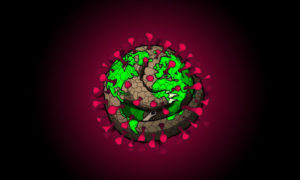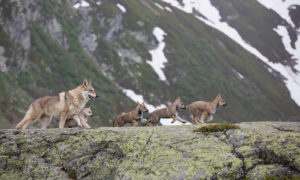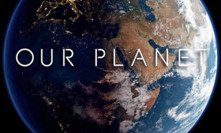Event Cinema
Wednesdays for the Planet | One Planet and Sanctuary Forest
Wednesdays for the Planet is a series of online screenings and virtual presentations with experts highlighting the natural world and other environmental challenges our planet faces. The virtual screenings are for educational purposes, non-profit and non-commercial.
World Wildlife Day
3 March is World Wildlife Day, the day of signature of the Convention on International Trade in Endangered Species of Wild Fauna and Flora (CITES) in 1973.
The Earth is home to countless species of fauna and flora – too many to even attempt counting. This rich diversity, and the billions of years during which its myriad elements have interacted, are precisely what has made our planet inhabitable for all living creatures, including humans. Historically, we have depended on the constant interplay and interlinkages between all elements of the biosphere for all our needs: the air we breathe, the food we eat, the energy we use, and the materials we need for all purposes. However, unsustainable human activities and overexploitation of the species and natural resources that make up the habitats and ecosystems of all wildlife are imperiling the world’s biodiversity. Nearly a quarter of all species are presently at risk of going extinct in the coming decades, and their demise would only speed up the disappearance of countless others, putting us in danger as well.
On World Wildlife Day, we celebrate the special place of wild plants and animals in their many varied and beautiful forms as a component of the world’s biological diversity. We will work to raise awareness of the multitude of benefits of wildlife to people, particularly to those communities who live in closest proximity to it, and we will discuss the threats they are facing and the urgent need for governments, civil society, private sector actors and individuals to add their voices and take actions to help conserve wildlife and ensure its continued use is sustainable.
On 3 March 2021, CITES will be hosting the global virtual celebration at 14:00 CET.
Documentaries
Our Planet: One Planet
Our Planet is an eight-part docuseries that explores the unique and precious wonders of our natural world. The docuseries combines stunning photography and technology with an unprecedented, never-before-filmed look at the planet’s remaining wilderness areas and their animal inhabitants. The ambitious four-year project has been filmed in 50 countries across all the continents of the world, with over 600 members of crew capturing more than 3,500 filming days, focusing on the breadth of diversity of habitats around the world, from the remote Arctic wilderness and mysterious deep oceans to the vast landscapes of Africa and diverse jungles of South America.
Narrated by Sir David Attenborough, Our Planet is a groundbreaking collaboration between WWF, Netflix and Silverback Films. It has also won two Emmy awards for Outstanding Documentary Series and Outstanding Narrator.
In the episode One Planet, witness the Earth’s natural beauty. Learn how the habitats that make up our planet are connected and reliant upon each other; the astonishing diversity of life on Earth depends on these global connections.
Sanctuary Forest (Fôret sanctuaire)
The forest reserve of the Grand Bois de Satigny was established by Geneva’s Conseil d’Etat on 23 May 2018. With nearly 100 hectares, it is one of the largest integral forest reserves in the Swiss Plateau, thus meeting the recommendations and priorities of the Swiss Confederation. All logging and active management of natural environments is prohibited in this reserve. The reserve remains fully open to the public and will offer future generations the opportunity to discover a large space devoted entirely to nature and its natural evolution.
This documentary was created by Coline Utz/Lémanbleu with the support of the Canton of Geneva.
Online Screenings
Our Planet: One Planet
Sanctuary Forest (Fôret sanctuaire)
This documentary is only available in French and we would like to thank the Canton of Geneva for their support.
Experts

Colman O'Criodain
Policy Manager, Wildlife Practice, at WWF International
Dr. Colman O’Criodain is WWF’s lead expert on CITES and wildlife trade issues, coordinating and advocating for WWF’s position at CITES’ Conference of the Parties (CoP), Standing Committee and Technical Committee meetings. He has played a key role in the development of several species conservation programmes, including WWF’s Tigers Alive Initiative and the Sharks Restoring the Balance Initaitive. As a wildlife trade expert, he has led key roles in wider government-led initiatives and has peer reviewed two UNODC wildlife crime report. Previously, he helped facilitate a workshop on community-based conservation organized by the Austrian government in 2011, co-editing the subsequent publication, and played a similar role for the Mexican government at a workshop in 2008 on non-detriment findings in CITES. Colman was also a Senior Conservation Scientist working for the Irish Government, during which he spent three years on secondment to the European Commission as the technical lead on CITES issues, chairing the Scientific Review Group. He also compiled Ireland’s first list of Natura 2000 sites and initiated the first ever all Ireland dragonfly atlas, the first joint biological recording project with Northern Ireland.

Bertrand von Arx
Director, Biodiversity Section, Cantonal Office of Agriculture and Nature (OCAN), Department of Territory, Canton of Geneva
Bertrand von Arx is the Director of the Biodiversity Section at the Cantonal Office of Agriculture and Nature (OCAN), Department of Territory, of the Canton of Geneva. Prior to this role, he served as the national scientific authority for Canada responsible for endangered species at CITES. Previously, he also managed the application of CITES for plants at the Swiss Federal Office of Agriculture. At that time, he was also involved in many Specialist Groups of the IUCN and CITES Plants, Animals and Standing Committees, both representing first Europe, then North America. In addition, Bertrand has participated to promote numerous cultural activities for biodiversity in Geneva such as “La nuit est belle” to raise awareness about light pollution, which impacts wildlife as they are mostly active at night.
Virtual Presentations
Links
- Our Planet | Official Website
- Our Planet | WWF
- Our Planet | Netflix
- Our Planet | IMDB
- Biodiversity Strategy of Geneva – 2030 and Action Plan | Canton of Geneva
- Sanctuaire forestier, îlot de sénescence et arbre-habitat | Canton of Geneva
- Wednesdays for the Planet
- World Wildlife Day
More Documentaries for #WorldWildlifeDay

Corona: The Pandemic and the Pangolin
An uncomfortable, yet eye-opening, documentary that goes at the root of the pandemic to untangle the deep links between wildlife and our health

The Sanctuary: Survival Stories of the Alps
An incredible journey through the frozen heart of Europe to discover that it is not always the strongest who survives, but more often those who help each other

A Plastic Ocean
A breathtaking movie exploring the fragile state of our oceans and uncovers alarming truths about the consequences of our disposable lifestyle

